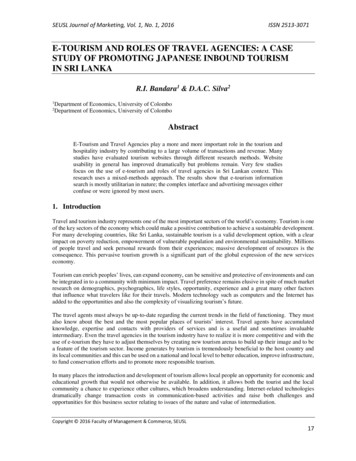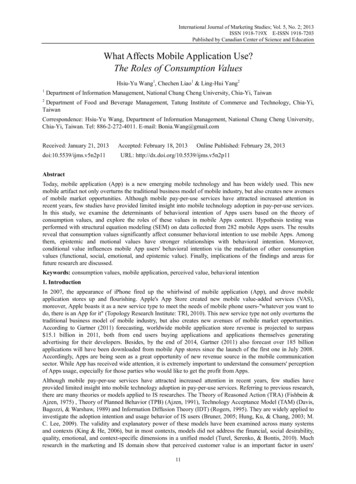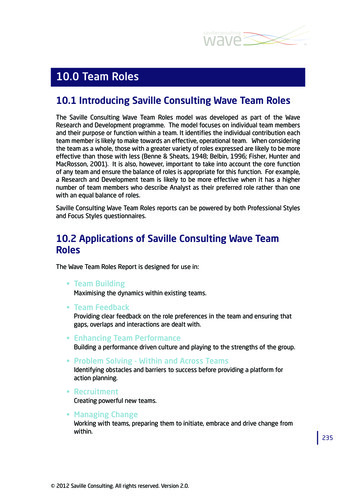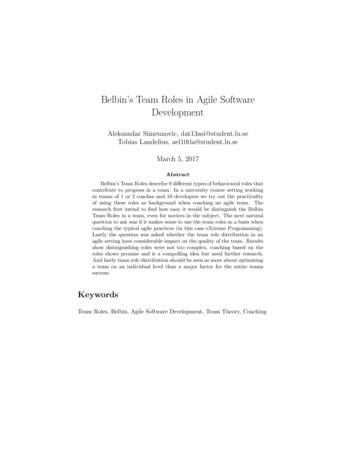
Transcription
How might leadership roles evolve inintegrated health and care systems?Report for the NHS Leadership Academy
About SCIEThe Social Care Institute for Excellence improves the lives of people of all ages byco-producing, sharing, and supporting the use of the best available knowledge andevidence about what works in practice. We are a leading improvement supportagency and an independent charity working with organisations that support adults,families and children across the UK. We also work closely with related services suchas health care and housing.We improve the quality of care and support services for adults and children by: identifying and sharing knowledge about what works and what’s new supporting people who plan, commission, deliver and use services to put thatknowledge into practice informing, influencing and inspiring the direction of future practice and policy.Written by Ewan King and Ellie Mendez SawyerFirst published in Great Britain March 2021 by the Social Care Institute for Excellence SCIE All rights reservedSocial Care Institute for Excellence54 Baker Street, London W1U 7EXwww.scie.org.uk
ContentsIntroduction . 1Key questions of this research . 2Key messages . 3NHS Long Term Plan and the implications for system leadership . 5Integral leadership roles emerging . 8Key factors that can act as enablers or barriers to how leadership rolesmust evolve . 12Clarity . 12Innovation and learning . 14Representative and balanced leadership . 15Connectivity and relationships. 18Resources and finances . 20Capabilities, skills and behaviours that are needed to ensure leaders areable to deliver on the NHS Long Term Plan’s priorities . 21Supporting and developing system leaders . 24Role of the NHS Leadership Academy . 29Empowerment role . 29Guidance role . 29Evaluation and quality assurance role . 31Mapping and signposting role . 31Contribute to ICSs . 31A convenor . 32References . 33Appendix 1: System leadership and COVID – Case study of practice . 34
How might leadership roles evolve in integrated health and care systems?IntroductionThames Valley and Wessex Leadership Academy (now part of NHS South EastLeadership Academy) commissioned the Social Care Institute for Excellence (SCIE)to undertake this research to further expand the understanding of the evolving rolesof collaborative leaders across health and care systems. This research will informthe further development of multi-professional, collaborative leadership models acrossthe NHS and targeted programmes of support. This report is based on a short reviewof recent literature on system leadership in integrated care systems and sustainabletransformation partnerships (STPs), findings from interviews with senior systemleaders, and a roundtable with a mix of national policy-makers, planners and leadersworking in local health and care systems. It builds on work which SCIE undertook in2018 on system leadership in integrated care systems and place-basedleadership development. Quotes from these leaders are presented throughout thereport along with case studies.The context for this research is the publication of the NHS Long Term Plan which setout a new vision and delivery plan for the NHS, at the heart of which was acommitment that every area become an integrated care system (ICS) by 2021. ICSsseek to bring together local organisations in a pragmatic and practical way todeliver the ‘triple integration’ of primary and specialist care, physical and mentalhealth services, and health with social care and make shared decisions withproviders on population health, service redesign and Long Term Planimplementation.The Long Term plan also set out an ambitious aim to develop great leadership at alllevels in the NHS and do more to nurture the next generation of leaders by moresystematically identifying, developing and supporting those with the capability andambition to reach the most senior levels of the service.Further to the Long Term Plan, NHS England and NHS Improvement also publishedthe Interim People Plan, which commits the NHS, in collaboration with its partners,to system leadership as the defining way in which local health and care is led.This has now been followed by We are the NHS: People Plan 2020/21, whichstates:‘We must do more to foster systems-based, cross-sector, multi-professionalleadership, centred around place-based healthcare that integrates care andimproves population health. This is not just a plan for secondary and tertiary care:we need to foster this leadership culture in all elements of NHS-funded care, inthe community, in all our providers and commissioners, and with all our partnersin social care, the voluntary and independent sectors.’In February this year, the Government published a White Paper – Integration andInnovation: working together to improve health and social care for all – whichbuilds on the Long Term Plan’s goals on integrating care around the person. TheWhite Paper will place ICSs on a statutory footing through both an NHS ICS board’(though this will also include representatives from local authorities) and an ICS1
2How might leadership roles evolve in integrated health and care systems?health and care partnership. The ICS NHS body will be responsible for the day-today running of the ICS, NHS planning and allocation decisions. The partnership willbring together the NHS, local government and wider partners such as those in thevoluntary sector to address the health, social care and public health needs of theirsystem. The issues explored in this paper about systems leadership and new rolesremain prescient to these new policy developments.This research was conducted between November 2019 and March 2020, and wastherefore completed just before the outbreak of COVID-19. To explore howleadership had adapted to the crisis within local health and care systems, NHSSouth East Leadership Academy asked SCIE to undertake a further case study toexplore how leaders had responded within a specific local area and what COVID-19might mean for future leadership roles. This involved interviews with four seniorleaders in Hertfordshire and West Essex STP which were conducted between Mayand July 2020. This case study is presented as a standalone appendix at the end ofthis report.Key questions of this research How will leadership roles and priorities evolve as a consequence of the NHS LongTerm Plan? What factors act as enablers and barriers to how leadership roles must evolve? What skills, capabilities and behaviours will system leaders of the future require? What will support system leaders need in the future to fulfil these new roles? What are the key features of successful system leadership developmentprogrammes? How can the NHS Leadership Academy best support ICS systems to develop andsupport system leaders?
How might leadership roles evolve in integrated health and care systems?Key messages The NHS Long Term Plan (LTP) and the recently published health and social careWhite Paper – Integration and Innovation: working together to improve health andsocial care for all - that system leaders push forward a transformation agenda at atremendous scale and pace that can feel overwhelming. It requires taking a longterm view to planning and prioritising certain areas at any one time. The LTP asks leaders to prioritise the interests of the wider system over those ofany individual organisation, focus on prevention and health populationmanagement, and to think differently about how to address the wider determinantsof health. Leaders must foster a significant cultural change if they are to succeedin all the above. Leaders must also contend with an LTP that places conflicting demands on themto deliver transformation whilst meeting a set of targets not necessarily aligned toa programme of change. The LTP also falls short in mapping out how toeffectively engage with and develop valuable roles for local authorities and inaddressing the severe workforce challenges facing health and social care. System leadership roles and governance structures need to continually evolve,but must do so in a way that is specific to individual systems and places. Effective system leadership can be facilitated or hindered by a number ofinterconnecting factors, particularly in relation to cultures, structures andapproach, which can be grouped under the following five domains: Clarity Innovation and learning Representative and balanced leadership Connectivity and relationships Resources and finances Effective system leadership relies on a composite set of capabilities, skills andbehaviours. These include: Leading through influence and empowerment, not hierarchy Being politically astute Having a flexible approach to how one works with the ‘rules’ Being able to think outside the box Being able to build and communicate a clear narrative The ability to live with ambiguity Being able to hold and manage multiple strategies3
4How might leadership roles evolve in integrated health and care systems? The ability to make things happen Being able to think ahead and plan for long-term objectives The ability to cede power and resources Having tenacity, courage and resilience The ability to build strong relationships and understand the importance ofnetworking and the psychology of change The ability to understand one’s self Leaders told us that the following factors are important when supporting anddeveloping system leaders: Identifying future leaders early on Having a varied menu of support and development programmes on offer Focusing on system leadership rather than organisational leadership Identifying and supporting leaders at all levels, not just the most senior Leaders identified several key features of successful leadership developmentprogrammes, including the need for offers to be locally owned and developed, andinvolving leaders from across a range of different sectors Leaders emphasised the important role they felt the NHS Leadership Academycould play in supporting locally developed system leadership programmes.
How might leadership roles evolve in integrated health and care systems?NHS Long Term Plan and the implications for systemleadershipConflicting views about the Long Term Plan (LTP) emerged from this research weconducted with system leaders. Some leaders suggested that the LTP articulates ahealthy demand on taking a greater interest in the whole system, as well asfocusing on prevention and health population management, rather than justtreating individual people. Others were concerned that the LTP falls short on the keyissues – with not enough emphasis being placed on the role of local authoritiesor the wider determinants of health. However, there was general consensus thatthe messages within the LTP signal a reassuring continuity from the centre and buildupon the rational and objectives of STPs/ICSs. Finally, those we spoke to arguedthat the plan places conflicting demands on leaders to deliver transformationwhilst meeting a set of targets not necessarily aligned to a programme ofchange.‘The challenge for leaders is to continue to deliver transformational change at thesame time of delivering the not insignificant performance demands of the LongTerm Plan – because the plan is so focused on targets and performance, ratherthan on transformational change.’Chief executive, NHS trustLeaders identified a number of significant implications of the Long Term Plan forsystem leadership: Leaders must take the long view. The plan demands change at scale and atpace but leaders emphasised the importance of remembering that it is a ten-yearplan, and consequently not everything should or could happen simultaneously. Subsequently – there is a need to prioritise. The Long Term Plan places toomany demands on local systems and therefore leaders need to be able toprioritise a few areas at a time. Leaders suggested that prioritising certain areasthat can be addressed quickly to demonstrate impact might be helpful. There is no single answer to achieve the Long Term Plan’s objectives.Leaders must take on a multifaceted approach to address current challenges andreach the plan’s objectives. Leadership roles need to be more system focused rather than organisationallytied. This means leaders must put aside the interests of any one individualorganisation and focus on how the system can achieve the best outcomes of theoverall population. It is imperative that system leaders become comfortable withworking across the system, developing relationships across multiple organisationsand sectors, and creating plans that involve the blending of traditional boundariesand partnerships. However, they must also deal with the challenge that theycontinue to be regulated against an old framework that asks them to put theinterests of their individual organisations first.5
6How might leadership roles evolve in integrated health and care systems? A significant cultural change is needed. For integrated care to become areality, leaders need to change the mindset of whole organisations and sectors.This will require co-developing a common vision and priorities. There must be a shift in focus to overall population health rather than just onthe individual health of each patient. It will require a considerable cultural changeand leaders will need to embed the idea of supporting better health of wholepopulation into all roles – not just clinical roles. Leaders must think and work differently to address the wider determinantsof health. The traditional approaches to addressing and supporting populationhealth have not worked so leaders must encourage dialogue with as manystakeholders as possible about new innovative approaches that are also morecommunity led.Limitations of the Long Term PlanWhilst recognising the demands that the LTP places on leaders, those withspoke with also cited a number of limitations with the plan that they felt made itmore difficult to achieve a more collaborative approach to public healthmanagement. The plan is not ambitious enough. Some leaders felt that that the LTPfailed to bring new and innovative ideas to the table and it was therefore notforward thinking enough. Leaders shared concerns that the plan continuedto reflect a siloed mentality embedded in national central governmentthinking.’I am unimpressed by the Long Term Plan. It is not ambitious and there isnothing in the plan that is not being done already somewhere in the country.I think it worries me because it is not focusing on what needs to happennext – where is the creativity?’ The current financial architecture and reporting requirements of theNHS are not yet aligned to the priorities of the LTP, and populationhealth management in particular.‘As we move into population-based strategies for ICSs, all the nationaltemplates and returns are still based against old top-down models and useblunt hospital-centric activity counting mechanisms. That doesn’t help tellthe transformational story we are trying to achieve.’ The LTP does not have a clear accountability and assurance system inplace. Leaders told us that it was currently difficult to understand whichindividual organisations will be held accountable for many of the metrics setout in the LTP. Some suggested that system leaders needed to put anaccountability framework in place to address this.‘The key performance indicators in the Long Term Plan - well there is quitea lot of them where it would be difficult to understand which individualorganisations will be held accountable. For example, the metrics around
How might leadership roles evolve in integrated health and care systems?public health or early diagnosis of cancer – there are so many differentorganisations that need to be involved in that – so it could be easy for chiefexecutives of hospitals to say that’s not my area” or “I’m doing what I can,it’s the other organisations that need to step up”. So as leaders of thesystem we need to ask - how can we put an accountability framework inplace to help us hold people to account?’ The LTP has an overdetailed prescription of what ‘good’ looks likeacross many areas which is not conducive with bottom-up co-designedplace-based leadership. For example, leaders mentioned that the plan’s overprescription of what should be delivered in relation to mental health servicesdoes not allow for a place-based approach to integrating mental health intopopulation health-improvement strategies. Gaps exist in the LTP around social care and the role of localauthorities. Alongside this, there is no equivalent long-term plan or nationalworkforce strategy for social care. Some leaders are concerned that the LTP does not include a sufficientlycoherent and integrated long-term approach to address the sector’sworkforce challenges. Leaders cited the need to consider factors such aseconomic development, affordable homes, targeting workforces from othersectors forecast to see job losses (such as retail), ‘grow your own’strategies, supporting and mobilising local communities to volunteer, orcapital investment to halt the heavy reliance on a low-wage, low-skill, highturnover workforce.’I think in many ways it is placing the wrong demands on leaders – it ismissing out on the key issues – like the role of local authorities, the widerdeterminants of health, and the terrible workforce shortages we have – andinstead focuses on the things we can count. Leaders will be rewarded forbean counting instead of transformational change.’7
8How might leadership roles evolve in integrated health and care systems?Integral leadership roles emergingThis research found that it was critical that leadership roles and governancestructures continue to emerge and evolve. In fact, having roles and structures thatare iterative has proved to be extremely important across many systems. Thesechanges feel more like a continuation of an evolution already very much in progress.Leaders told us that it has been helpful when there is flexibility for roles andstructures to develop alongside new relationships across organisations and sectors.For the NHS Confederation (2019), giving local areas the power to shape their ownstructures in ways that reflect local circumstances i
2018 on system leadership in . integrated care systems. and . place-based leadership development. Quotes from these leaders are presented throughout the report along with case studies. The context for this research is the publication of the NHS Long Term Plan which set out a new vision a











